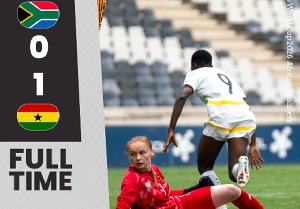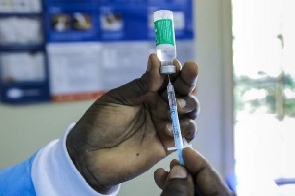INVESTORS who’ve been punishing Ghana bonds amid lax government fiscal policies and the plunge in oil are giving the debt a fresh look this month as talks with the International Monetary Fund progress.
Yields on the West African nation’s $1 billion of securities due January 2026 have dropped 2.21 percentage points since reaching an all-time high on December 16.
Ghana’s dollar notes, which lost 3.5% last month, have returned 8.5% in February, the most after Venezuela among 58 emerging markets tracked by Bloomberg.
The comeback is being fuelled by mounting speculation the IMF negotiations are close to fruition, with aid helping Ghana fund its budget deficit and support the cedi, the worst African currency over the past 12 months. Investors have been looking past the nation’s failure to keep the fiscal gap in check after winning a loan from the Washington-based lender in 2009.
“We have been waiting patiently for Ghana to strike a deal with the IMF and we believe that this outcome is finally set to materialize,” Shahzad Hasan, who helps manage $1.8 billion in emerging-market debt at Allianz Global Investors, said by e-mail from London on Tuesday. “We have been building a position in Ghanaian debt over time in expectation of this outcome.”
The country of 26 million is West Africa’s second-biggest economy after Nigeria and exports gold, cocoa and oil. It is less reliant on crude for government revenue than Nigeria and Angola and its debt should have held up better as global crude prices sank, according to Standard Life Investments Ltd.
“Ghana was unfairly punished,” Mark Baker, who helps oversee about $1.5 billion in emerging-market debt at Standard Life, including Ghanaian bonds, said by phone from London on February. 23. “The rally has been a correction of that.”
Ghanaian President John Dramani Mahama turned to the IMF for a loan of about $1 billion in August as high spending and power cuts slowed growth and weakened the cedi, which has dropped 27% against the dollar in the past year. Inflation was more than 16% in January and public debt rose to $23 billion, or about 67% of gross domestic product, at the end of 2014. Growth will fall to 4% this year, its slowest rate since 2009, according to economists’ forecasts compiled by Bloomberg.
An IMF team is in Ghana this week and could finalise a programme by the first week of March to present to the IMF board, James Klutse Avedzi, chairman of the finance committee in Parliament, said by phone Tuesday from Accra. The nation will probably have an IMF program in April, he said. The team is making “good progress” in talks with Ghanaian authorities, an IMF spokesman said in an e-mailed response to questions Tuesday.
Not all investors are convinced. Ghana’s fiscal deficit widened in 2010 following the IMF bailout, according to data from the lender. It reached 12.1% of gross domestic product in 2012, the year Mahama won the presidency. He may run for a second term in December 2016.
“I don’t have any exposure because I’m still skeptical about the IMF deal,” Claudia Calich, a money manager at M&G Ltd. in London, which oversees about $1 billion of emerging- market assets, said by phone on Feb. 23. “Without a fiscal adjustment, there’s no IMF deal.”
Ghana is seeking to narrow the budget deficit to 6.5% of GDP this year, down from an average of about 10% in the past three years. The government is considering spending cuts and raising revenue from other sources, including tax increases.
Yields on the Ghanaian 2026 Eurobond dropped one basis point by 8:09 a.m. in London on Wednesday to 8.62%. The cedi weakened 1.3% to 3.49 per dollar.
“Assuming the programme is approved, the reforms contained in it can soon start to be implemented,” Angus Downie, London- based head of economic research at Ecobank Transnational Inc., said in response to e-mailed questions February 23. “It is this outcome that is helping support a positive outlook for Ghana by many investors in Eurobonds.”
•With assistance from Andrew Mayeda in Washington.
Business News of Thursday, 26 February 2015
Source: bloomberg.com
Investors who took a gamble on Ghana rewarded
Entertainment












